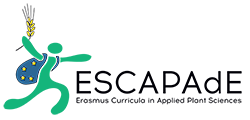English title:
Agroecology
Course ID:
833103
ECTS credits:
3,0
Title in native language:
Agrarökologie
Agrarökologie
Term Semester:
Autumn/Winter
Instruction language(s):
German
Course content:
Part I: Fundamentals of ecology: environment of organisms, populations, ecological niche, co-existence, competition, trophic level, food webs, energy and material flow, biocoenosis, ecosystems, biomes, human demography, alteration of atmosphere and climate (greenhouse effect, ozone, acid rain).
Part II: Agroecology Introduction in agroecology as the basic science of the functionability of agro-ecosystems under special respect of sustainability. After an overview on structure and function of agro-ecosystems, the different compartments are treated: cultivated plants as producers of harvestable biomass, weeds as competitors for resources, energy-flows through agro-ecosystems under special respect of the need of fossil-energy in agriculture, material cycling with the nitrogen example, soil-life as a system of reducers and recyclers, as well as self-regulation of plant diseases and pests focussing on the enhancement of beneficials. Finally, the agroecological significance of uncultivated biotopes in the cultural landscape is dealt with.
Part III: Introduction in agroecosystems and production methods; men as actor in the agroecosystem; nutrient cycles, energy consumption in agriculture, effects of pesticides on environment, soil compaction, soil erosion.
Part II: Agroecology Introduction in agroecology as the basic science of the functionability of agro-ecosystems under special respect of sustainability. After an overview on structure and function of agro-ecosystems, the different compartments are treated: cultivated plants as producers of harvestable biomass, weeds as competitors for resources, energy-flows through agro-ecosystems under special respect of the need of fossil-energy in agriculture, material cycling with the nitrogen example, soil-life as a system of reducers and recyclers, as well as self-regulation of plant diseases and pests focussing on the enhancement of beneficials. Finally, the agroecological significance of uncultivated biotopes in the cultural landscape is dealt with.
Part III: Introduction in agroecosystems and production methods; men as actor in the agroecosystem; nutrient cycles, energy consumption in agriculture, effects of pesticides on environment, soil compaction, soil erosion.
Learning outcomes:
Part I (Univ. Prof. Dr. Thomas Frank): An introduction in ecology is provided. Students learn basic knowledge and learn to understand elemantary processes, which are essential for the function and alteration of ecosystems. The provision of basic knowledge prepares students well for parts II and III, because they will better understand and be able to interpret specific agroecological facts.
Part II (Dr. Bernhard Kromp) of the lecture provides an introduction in agroecology. On the basis of selected topics, agroecological basic knowledge will be elucidated. Students learn to evaluate agroecological basic knowledge for its significance and implementation in sustainable agriculture.
Part III (Ao. Univ. Prof. Dr. Jürgen Friedel): Students get an understanding on land use systems and agricultural systems. Students learn the context, dimensions, scales and significance of agricultural activities, and learn to estimate impacts into nature and environment.
Part II (Dr. Bernhard Kromp) of the lecture provides an introduction in agroecology. On the basis of selected topics, agroecological basic knowledge will be elucidated. Students learn to evaluate agroecological basic knowledge for its significance and implementation in sustainable agriculture.
Part III (Ao. Univ. Prof. Dr. Jürgen Friedel): Students get an understanding on land use systems and agricultural systems. Students learn the context, dimensions, scales and significance of agricultural activities, and learn to estimate impacts into nature and environment.
Exam method:
written
For each part of the exam (Frank, Kromp, Friedel) students can reach 18 points, summing up to 54 points.
Students must reach 7 points minimum to pass the exam.
Marking:
Points Mark
0 - 27 : 5
27,5 - 34 : 4
34,5 - 41 : 3
41,5 - 48 : 2
48,5 - 54 : 1
For each part of the exam (Frank, Kromp, Friedel) students can reach 18 points, summing up to 54 points.
Students must reach 7 points minimum to pass the exam.
Marking:
Points Mark
0 - 27 : 5
27,5 - 34 : 4
34,5 - 41 : 3
41,5 - 48 : 2
48,5 - 54 : 1
Organisation: University of Natural Resources and Life Sciences Vienna
Country:
Austria
Acronym:
BOKU
ERASMUS+ code:
A WIEN03
Teaching period summer semester:
22. Feb 2021 - 30. Sep 2021
Teaching period winter semester:
13. Oct 2020 - 21. Feb 2021
University website:
